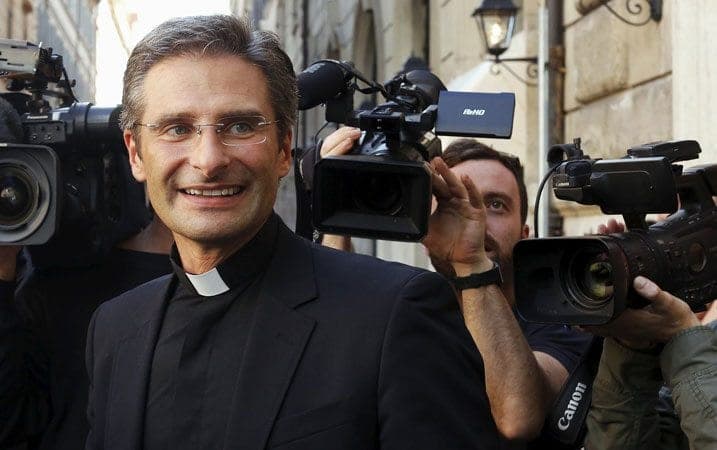ROME — A gay priest fired by the Vatican for coming out publicly on the eve of the Oct. 4-25 Synod of Bishops on the family has insisted that Catholicism should change its approach to gays and lesbians, saying the Church “cannot continue destroying our lives.”
“We gays, lesbians, and transsexuals were not created defective,” he said.
Polish Monsignor Krzysztof Charamsa, 43, also denied on Tuesday that he has received financial support for his decision to go public, saying “so far I haven’t received anything from anyone, not even a single Euro.”
Charamsa made the comments Tuesday night in an interview with the Italian television network Retequattro.
Until recently, Charamsa had been a minor official within the Congregation for the Doctrine of the Faith, the Vatican’s powerful doctrinal watchdog agency. His primary role had been to arrange logistics for meetings of the International Theological Commission, a panel of Catholic theologians who advise the Vatican.
The day before the Synod of Bishops opened, where the question of the Church’s approach to gays and lesbians was expected to a major topic of discussion, Charamsa scheduled a press conference in front of the doctrinal congregation to announce that he is in a long-term relationship with a partner from the Catalonia region of Spain named Eduardo Planas.
In the end, however, Charamsa and Planas spoke to reporters in another location. Soon afterward, a Vatican spokesman said that Charamsa could no longer continue in his Vatican position, calling his apparent attempt to influence the synod’s discussions “very serious and irresponsible.”
Homosexuality has been a recurrent theme in the synod, with many participants expressing a desire for a more “inclusive” language, while others insisting it’s important for the Church not to weaken its doctrine.
In the wake of Charamsa’s announcement, some Italian media outlets speculated that he had been paid to come out on the eve of the synod. In his interview with the Italian TV program, however, Charamsa, denied those assertions.
“I heard horrible descriptions and accusations, as if I received money or material goods,” he said, speaking from Barcelona where he’s now living with Planas, to whom he’s engaged. (Spain has permitted gay marriage since 2005).
In fact, Charamsa said, “I’ve lost my job and I’ve not received anything. In the last few hours before deciding what to say to my Church, I found a few Christian friends who gave me a roof over my head.”
“I have no lobby behind me,” he said.
Charamsa told the program he felt compelled to conceal his sexual orientation for virtually his entire career.
“I had to hide being homosexual not only in the Vatican, but for my entire ecclesiastical life: during studies in the seminary, during my work in the university, in my parish, in every ecclesiastical setting,” he said.
“To be gay in that period was something ugly, horrible, which had to be refused, eliminated, and destroyed, even if it was part of you,” Charamsa said.
As a young man, he said, he prayed that God would take away a sexual impulse he was taught to see as “demonic.”
Now, Charamsa said, there’s no going back.
“A year from now, I see myself free, happy, out of the closet, and serving the same ideals and the same values for which I became a priest,” he said.
An Italian prelate invited to join the program, Bishop Giovanni D’Ercole of Ascoli Piceno, a former official of the Vatican press office and later the Secretariat of State, said that he “prays” for Charamsa, but that coming out on the eve of the synod was “the wrong moment.”
D’Ercole also said that while the Church disapproves of gay acts, it has “great compassion” for gay people.
















